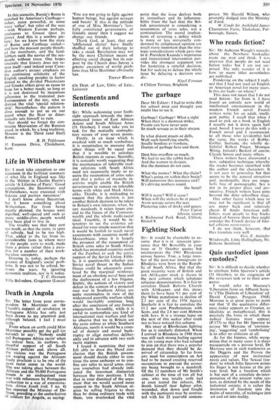Sentiments and interests
Sir: While welcoming your forth- right approach towards the inter- connected issues of East African Asians and South African Arms (31 October), I must take you to task for the mutually contradic- tory nature of your seven points.
Firstly, in an issue which is overlaid with so much symbolism. it is meaningless to presume that other things will be equal and that it is Possible to calculate British interests in vacuo. Secondly, it is certainly worth suggesting that the maintenance of tolerable trad- ing relations with South Africa need not necessarily imply or re- quire the resumption of arms sales and that a policy of masterly in- activity might enable the British government to remain on tolerable terms with white and black Africa alike. Thirdly, it is misleading to suggest that the decision is just another British decision to be taken in Britain's own interests, when. by any standards, it raises issues cru- cial to the future of the Common- wealth and the whole multi-racial ideal. Fourthly, it would be in- terestine to see the evidence ad- duced for your simple assertion that it would be foolish to Teich naval agreements with countries north of Mozambique, since it is largely the prospect of the resumption of British arms sales to South Africa which has promoted countries north of the Zambesi to seek the active support of the Soviet Union. Fifth- ly, it is questionable whether any Soviet naval threat in the Indian Ocean could be adequately coun- tered by the marginal reinforce- ment of an obsolete naval base and the deployment of a few frigates. Sixthly. the notions of victory and defeat in the context of a projected race war in Southern Africa are quite meaningless in view of the widespread guerrilla warfare which would inevitably continue long after the conclusion of any formal engagement. Seventhly, while it is awful to contemplate any kind of international race warfare and fair to observe that we in Britain are the same colour as white Southern Africans. surely it would be a coun- sel of despair and moral bank- ruptcy to align ourselves deliber- ately and in advance with two such racist regimes.
I found it surprising that you felt able to draw the bland con- clusion that the British govern- ment should decide either to con- tinue the arms embargo or to con- fine any sales to naval arms, since you yourselves had already indi- cated the important distinction between the two positions. I felt that in your dismissal of the argu- ment that we would accord more support to the South African re-
gime by selling frigates to them than by doing ordinary trade with them, you overlooked the vital point that the issue derives both its immediacy and its inflamma- bility from the fact that the Bri- tish government is considering a resumption of arms sales, not a continuation. The moral implica- tions of resuming a policy which is more or less universally con- demned by enlightened opinion are much more important than the stra- tegic considerations which gave rise to it. President Kaunda's impetuous and impassioned intervention pro- vides the strongest argument not for hastening a spiteful decision, but for seeking to defuse the whole issue by delaying a decision sine die.
Nigel Forman 4 Clifton Terrace, Brighton








































 Previous page
Previous page